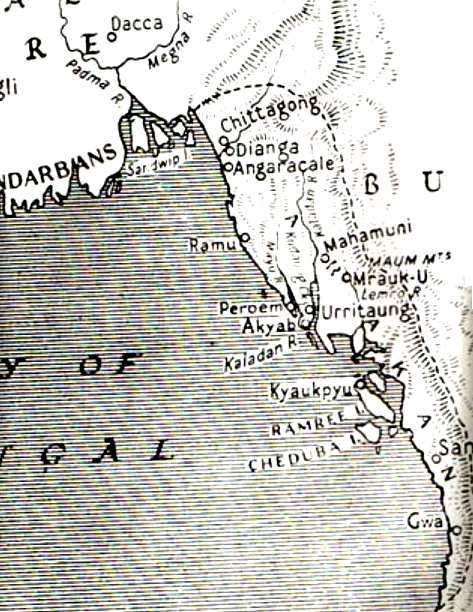
How the Arakanese state’s loss of access to Bengal’s resources and wealth in 1677 may partly explain the Arakanese hatred for the Rohingyas
By M Ahmedullah, 3 September 2017
For several centuries, there was an independent and powerful Arakanese state, and its capital was called Mrauk. The state enjoyed good trade with many regions in Asia and the Portuguese became its first European trading contacts. The Portuguese not only traded with Arakan but also interfered with and engaged in conflicts and warfare within the Arakanese state territories and beyond supporting and opposing the Arakanese. The Portuguese were also involved in the slave market of Mrauk by bringing captured people from the southern regions of Bengal to the Mrauk market and sold them as slaves.
The Arakanese state grew and became powerful to a significant degree through its access to Bengal’s wealth created by Bengal’s agricultural and textiles productions.
The Arakanese state-controlled Chittagong for a very long time and often the Arakanese army would raid into Bengal and take treasures, textiles and agricultural products back with them. There is a report that in the early 1640s of the Arakanese army reaching near Dhaka during an invasion, which was the capital of Moghul Province of Subah Bengal, and on the way back they took with them about 80,000 Bengalis to Mrauk to recreate a textile industry in the Arakan capital. This effort failed miserably as most of the Bengalis captured died of disease and starvation. Also, the lack of support structure, network and tradition of Bengal style textile production in Arakan meant that it was impossible to recreate something successful in Mrauk within a very short time something similar that was built in Bengal over more than a thousand years.
The Dutch also came to buy slaves from the slave markets of Mrauk in the early to mid-1600s, and there are records of them buying Bengali slaves from Mrauk to work on their controlled nutmeg plantations of Banda Islands, in current-day Indonesia. Some of the captured people brought to the Mrauk slave markets were from Bengal and some were from outside Bengal, from other parts of India, for example, Orrisa.
Rohingyas are the descendants of the mixing of captured people who were brought to the Arakan state by the Arakanese and the Portuguese, from Bengal and elsewhere, and some who came to trade from many parts of the Muslim world, local Arakanese who married the Bengali Muslims and new people who came to Arakan from India during British rule when the border was open.
The Arakanese hatred for the Rohingyas may partly be based on a deep historical humiliation suffered by the Arakanese in 1677 when Shaista Khan, the Moghul Viceroy, finally defeated and crushed the Arakanese army. This led to the Arakanese losing access to Bengal’s wealth and resources, which lead to the decline and weakening of the Arakanese state, which enabled the Burmese takeover of Arakan, which may partly explain the Arakanese hatred for the Rohingyas.